|
|
|
Sort Order |
|
|
|
Items / Page
|
|
|
|
|
|
|
| Srl | Item |
| 1 |
ID:
187125
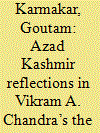

|
|
|
|
|
| Summary/Abstract |
The contested identity of Kashmir and Kashmiris and their intrinsic pain of hoping for freedom [Azadi] have found expression through The Srinagar Conspiracy, a novel by Vikram A. Chandra (2000). The article highlights how, through the fractured friendship between a Muslim and a Kashmiri Pandit boy, Chandra traces the upsurge of militant insurgency in Kashmir in the late 1980s and 1990s. The article also examines how the changing dynamics of identity were manipulated by the politics of ethnic and religious nationalism in Kashmir, leading to the 1989 insurgency and its drastic implications. The article also shows how the ethos of Kashmiriyat has been compromised, while the call for azad [free] Kashmir has remained an unrealised dream.
|
|
|
|
|
|
|
|
|
|
|
|
|
|
|
|
| 2 |
ID:
187121
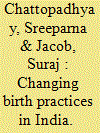

|
|
|
|
|
| Summary/Abstract |
Institutional births increased in India from 39% to 79% between 2005 and 2015. Drawing from 17 months of fieldwork, this article traces the shift from home to hospital births across three generations in a hamlet in Assam in Northeast India. Here, too, one finds that most births have shifted from home to hospital in less than a decade, aided by multiple factors. These include ‘free’ birthing facilities and financial incentives offered by government schemes, idiosyncratic changes within the hamlet, such as the introduction of biomedical practices through home births where oxytocin was used, and changes in cultural belief systems among local people. The exploration reveals significant transitions between (and fluidities of) categories such as local/global, tradition/modernity, past/present and nature/technology, creating a complex and ambivalent narrative of change, in which the voices of mothers should not be ignored.
|
|
|
|
|
|
|
|
|
|
|
|
|
|
|
|
| 3 |
ID:
187119
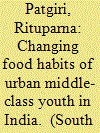

|
|
|
|
|
| Summary/Abstract |
The liberalisation of the Indian economy facilitated significant changes in the eating habits of urban middle-class Indians since the 1990s. While there have been studies on food and Indian society before liberalisation, on ‘street food’ and the impact of restaurants and practices of eating out after liberalisation in India, the rising phenomenon of ‘ordering in’ has remained relatively under-researched. This article examines the impact of online food delivery service providers on the food habits of urban middle-class youth in India. It finds that the combined effects of demonetisation and the related push towards digitalisation strengthened online food delivery services in the market. Subsequently, ordering in has become a regular part of the eating culture of urban middle-class youth, particularly during the COVID-19 pandemic. The study offers new insights into remarkable recent changes in the psycho-social and socio-economic structures of Indian society, affecting both consumers and service providers.
|
|
|
|
|
|
|
|
|
|
|
|
|
|
|
|
| 4 |
ID:
187122
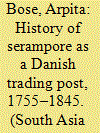

|
|
|
|
|
| Summary/Abstract |
Serampore, a small town of West Bengal, today virtually a suburb of Kolkata, has an unusual history and heritage as a Danish trading post/colony between 1755 and 1845. Creating a bustling, well-organised town, the Danes introduced various reforms which prepared the nineteenth-century awakening in Bengal. While the history of this Danish involvement at Serampore awaits fuller archival research, this article feeds on a range of local sources and contemporary travel accounts to discuss details of the Danish engagement in Serampore. The article also illustrates how, beyond the dominant British influence, colonial India experienced other foreign interventions that remain pertinent today, not just regarding trade but also missionary activities and some local sub-structures that have become almost invisible.
|
|
|
|
|
|
|
|
|
|
|
|
|
|
|
|
| 5 |
ID:
187120
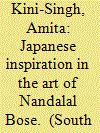

|
|
|
|
|
| Summary/Abstract |
This article explores the impact of Japanese art and its techniques on the work of Nandalal Bose (1882–1966), one of India’s pre-eminent artists, by locating specific influences from leading Japanese artists of his era, with whom he had close associations during his lifetime. It builds a case for the argument that despite being a staunch advocate for indigenous aesthetics, the depth and versatility of Nandalal’s artistic oeuvre was rooted in his ability to absorb select practices from other artistic cultures, specifically the Japanese, enabling us to connect the origins of India’s modernistic art practices principally to him. The article draws attention to the stylistic and ideological learning that he acquired during interactions with master artists from Japan, including Yokoyama Taikan, Hishida Shunsō and Arai Kanpō and demonstrates the significance of these Japanese influences to both Nandalal’s artistic life and, as a direct result, to the stylistic direction taken by Indian art in the mid-twentieth century.
|
|
|
|
|
|
|
|
|
|
|
|
|
|
|
|
| 6 |
ID:
187123
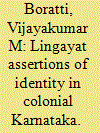

|
|
|
|
|
| Summary/Abstract |
In the wider context of how census enumeration has been studied with varied academic interests in South Asian history, this article focuses on how the Lingayats of Karnataka, since the colonial period, received, negotiated and manipulated their hurtful description in the 1881 Census as a low-caste Hindu community, defending themselves against British and Brahmins’ misuse of taxonomic navigation.
|
|
|
|
|
|
|
|
|
|
|
|
|
|
|
|
| 7 |
ID:
187124


|
|
|
|
|
| Summary/Abstract |
Before the exodus of many people and the political leadership from the territory of Tibet, both the macro-governmental and micro everyday sociocultural existence were dominated by Buddhist religion and religious personalities. The wealth of the nation was decided and measured by the ever-increasing number of grand monasteries and religious personalities. This article argues that after more than six decades of democratic internal governance in exile, the earlier dominance of religion and religious personalities has now taken a hegemonic turn in this democracy without territory. Despite the Fourteenth Dalai Lama’s unprecedented decision to relinquish his formal governmental authority in exile, the continued dominance of religion in the polity and everyday life of Tibetans is notable and is critically examined in this article.
|
|
|
|
|
|
|
|
|
|
|
|
|
|
|
|
|
|
|
|
|